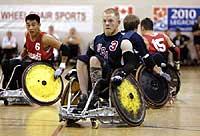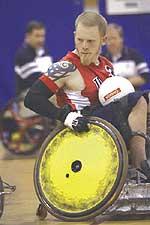This piece about the film Murderball will be published next week -- but you can read it here first.
 “You’re not going to hit a kid in a chair?” asks American Paralympian Mark Zupan.
“You’re not going to hit a kid in a chair?” asks American Paralympian Mark Zupan.
“Hit me – I’ll hit you back.”
Zupan is one the stars of Murderball, a new documentary about wheelchair rugby – aka “Murderball” – which has just opened in cinemas across the United States.
With his combative manner, Zupan gives notice that Murderball is not what the film’s makers dismissively refer to as another “inspiring disability movie.”
“We never wanted to make one of those up-with people, pat-on-the-back, good-for-you films,” says co-director Dana Adam Shapiro.
“A lot of stories about people overcoming obstacles are unintentionally condescending.”
“I’d like to imagine that people watching the film are thinking, ‘that guy is so cool,’ or, ‘he’s a jerk,’ just the way they’d react to any on-screen personality, instead of ‘I’m so proud of him,’” adds producer Jeffrey Mandel.
Murderball follows the American and Canadian wheelchair rugby teams in the run up to the Athens Paralympics, where Team USA beat Great Britain 43-39 to claim the bronze medal.
But the documentary is not just aimed at avid sports fans. It raises universal issues of patriotism, family relationships – and even sex.
 Murderball explores the rivalry between Mark Zupan and Joe Soares, a former Team USA player who angered former team mates when he became coach of Canada’s wheelchair rugby squad.
Murderball explores the rivalry between Mark Zupan and Joe Soares, a former Team USA player who angered former team mates when he became coach of Canada’s wheelchair rugby squad.
The directors spotted Zupan’s star quality immediately.
“Zupan looked as if he were straight out of a Mad Max film,” says co-director Henry-Alex Rubin.
“He was covered with tattoos and sported a buzz cut and a prison goatee.
“Every sports story needs a rivalry, and Zupan made it clear he hated Joe Soares. It was Frasier vs. Ali.”
The film, which will be released in the UK later this year, has already won considerable acclaim in the US. Reviewers have described it as “mesmerizing” and “astonishing” and it received two awards at the prestigious Sundance Film Festival.
Disability sport has struggled to gain widespread exposure in the United States. Last year’s Athens Paralympics were barely covered by the American media. So there are high hopes that Murderball will help attract a whole new audience.
“The media coverage of the film so far has been very, very positive,” Joe Walsh, Managing Director of US Paralympics, told BBC Sport Online.
“People who have seen Murderball say they have come away with a much better understanding of just how highly competitive Paralympic sport is and how committed the players are.”
Murderball is not just winning over the viewers and critics. Other Paralympians are pleased with the film -- and are now queuing up for the big screen treatment.
“Athletes are generally the sort of people who like being in the limelight and some have been asking why the film wasn’t about them,” jokes Joe Walsh.
“All our athletes recognise that the film is good for Paralympic sport – but they want to know when they’ll get to be in a movie!”
 “You’re not going to hit a kid in a chair?” asks American Paralympian Mark Zupan.
“You’re not going to hit a kid in a chair?” asks American Paralympian Mark Zupan.“Hit me – I’ll hit you back.”
Zupan is one the stars of Murderball, a new documentary about wheelchair rugby – aka “Murderball” – which has just opened in cinemas across the United States.
With his combative manner, Zupan gives notice that Murderball is not what the film’s makers dismissively refer to as another “inspiring disability movie.”
“We never wanted to make one of those up-with people, pat-on-the-back, good-for-you films,” says co-director Dana Adam Shapiro.
“A lot of stories about people overcoming obstacles are unintentionally condescending.”
“I’d like to imagine that people watching the film are thinking, ‘that guy is so cool,’ or, ‘he’s a jerk,’ just the way they’d react to any on-screen personality, instead of ‘I’m so proud of him,’” adds producer Jeffrey Mandel.
Murderball follows the American and Canadian wheelchair rugby teams in the run up to the Athens Paralympics, where Team USA beat Great Britain 43-39 to claim the bronze medal.
But the documentary is not just aimed at avid sports fans. It raises universal issues of patriotism, family relationships – and even sex.
 Murderball explores the rivalry between Mark Zupan and Joe Soares, a former Team USA player who angered former team mates when he became coach of Canada’s wheelchair rugby squad.
Murderball explores the rivalry between Mark Zupan and Joe Soares, a former Team USA player who angered former team mates when he became coach of Canada’s wheelchair rugby squad. The directors spotted Zupan’s star quality immediately.
“Zupan looked as if he were straight out of a Mad Max film,” says co-director Henry-Alex Rubin.
“He was covered with tattoos and sported a buzz cut and a prison goatee.
“Every sports story needs a rivalry, and Zupan made it clear he hated Joe Soares. It was Frasier vs. Ali.”
The film, which will be released in the UK later this year, has already won considerable acclaim in the US. Reviewers have described it as “mesmerizing” and “astonishing” and it received two awards at the prestigious Sundance Film Festival.
Disability sport has struggled to gain widespread exposure in the United States. Last year’s Athens Paralympics were barely covered by the American media. So there are high hopes that Murderball will help attract a whole new audience.
“The media coverage of the film so far has been very, very positive,” Joe Walsh, Managing Director of US Paralympics, told BBC Sport Online.
“People who have seen Murderball say they have come away with a much better understanding of just how highly competitive Paralympic sport is and how committed the players are.”
Murderball is not just winning over the viewers and critics. Other Paralympians are pleased with the film -- and are now queuing up for the big screen treatment.
“Athletes are generally the sort of people who like being in the limelight and some have been asking why the film wasn’t about them,” jokes Joe Walsh.
“All our athletes recognise that the film is good for Paralympic sport – but they want to know when they’ll get to be in a movie!”

0 Comments:
Post a Comment
<< Home